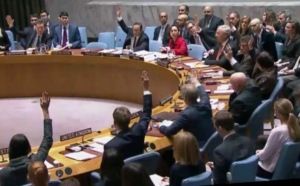News
News in Digest: 21st century champions of solidarity
This article is more than 7 years old.
Denmark talking tough, particularly regarding Russian aggression, but strong stance goes unrecognised by Transparency International

Denmark is increasingly being heard (photo: United Nations)
Few words embody the indomitability of the human spirit as effectively as solidarity. From Polish shipyard unions to freedom fighters, its essence underpinned many of the 20th century’s greatest triumphs over adversity.
Fast-forward to 2018 and the movement’s new posterboy is Danish PM Lars Løkke Rasmussen, who has been dishing out pledges of solidarity like they’re smarties.
Behind Britain
First in the queue is Britain and its defiant stance in response to the alleged Russian state’s attack on former Soviet operative Sergei Skripal and his daughter in Salisbury.
“We will be in close dialogue with our British allies to consider what countermeasures will take place,” said Rasmussen. “We still have sanctions against an increasingly aggressive Russian state following their invasion of the Crimea Peninsula.”
Hunting Red October
Four weeks ago, a majority in Parliament voted to beef up defence spending, citing a perceived increased threat from Russia. And the spending will again enable Danish Defence to hunt submarines, reports Ingeniøren.
As well as in the Baltic, subs presumed to be hostile have been observed in the strategically important waters around Greenland, and an analysis carried out by the Defence Ministry in 2016 pointed out that Denmark was also unable to detect and deter subs in the Arctic seas.
Underpinning Ukraine
Russia was also in the telescopic sight when the foreign minister, Anders Samuelsen, announced 860 million kroner of funding to aid reform in Georgia and Ukraine over the next five years.
On a visit to the region in February, Samuelsen underlined “unequivocal backing for two countries under pressure from Russia”, adding that “reform is the best defence against Russian aggression”.
Samuelsen will host a big international conference in Copenhagen on June 27 concerned with making reforms in Ukraine, to which foreign ministers from all the EU, NATO and G7 nations have been invited.
Plea for Syrian justice
Emboldened by his stance against Russia perhaps, Samuelsen declared a 30-day ceasefire in Syria a step in the right direction, but underlined that all countries had a responsibility to get the Syrian government to halt its bombardment and allow humanitarian aid.
“Denmark is actively supporting the mechanisms under the UN and other organisations that work towards prosecuting the guilty parties when the time comes. That’s something the world community must focus on,” said Samuelsen.
To bring matters full circle, the foreign minister mentioned Russia as a country that needed to stand up and be counted in the wake of escalating violence in Syria in recent weeks.
Tough in the Sahel
The government is also talking tough over the Sahel region in Africa, where it has revealed it intends to step up its efforts to combat terrorism and irregular migration.
At a G5 meeting in Brussels in February, Denmark announced it was earmarking 99 million kroner over three years to regional peacekeeping and stabilisation efforts in the embattled region.
The focus of the funding will be fighting organised crime and terrorism, boosting the justice sector, and other initiatives to support G5 efforts in the region.
Less transparent
Nevertheless, despite all the solidarity, Denmark has lost its place at the top of the Transparency International ranking, where it has stood alongside New Zealand since 2012.
Natascha Felix, the chair of the Danish department of Transparency International, told Politiken the fall was an “alarm signal” caused by IT firm Atea’s publicised bribery case, the new freedom of information laws, the way SKAT gave away 12 billion kroner to fraudsters, and the abuse of power in connection with the Chinese official state visits in 2012 and 2013.
Felix would like to see action taken on a political level – especially the lack of transparency over private support to political parties and the lack of a register of lobbyists – while others despaired of the lack of transparency regarding private funding for political parties.






































